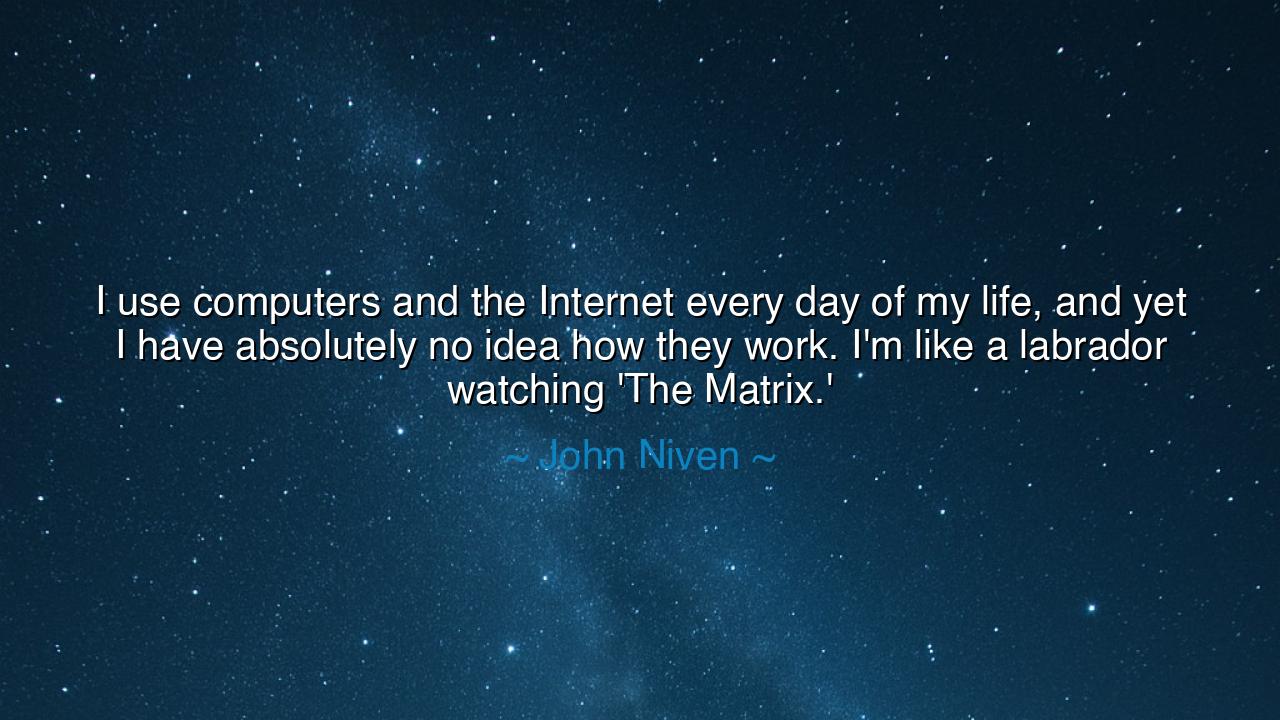
I use computers and the Internet every day of my life, and yet I
I use computers and the Internet every day of my life, and yet I have absolutely no idea how they work. I'm like a labrador watching 'The Matrix.'






There is both humor and humility in the words of John Niven, who once confessed, “I use computers and the Internet every day of my life, and yet I have absolutely no idea how they work. I'm like a labrador watching 'The Matrix.'” Beneath the laughter of this statement lies a profound reflection on the age in which we live—an age where men and women wield powers once reserved for gods, yet understand them as little as fire was understood by the first who tamed it. His words are a mirror to our modern souls, revealing how swiftly progress has outrun comprehension, and how easily we mistake use for understanding.
The meaning of this quote is layered in irony and insight. Niven, with playful candor, acknowledges a truth many share: we dwell in a world built by technology that few among us truly grasp. The computer—that silent oracle of the modern age—has become as commonplace as bread, as invisible as air. We press keys, send messages across oceans, summon images and voices from the ether, yet cannot fathom the invisible threads that bind it all together. Like a labrador watching ‘The Matrix,’ we gaze at the glowing screen, enchanted, obedient, yet blind to the deeper machinery that animates it.
To the ancients, such a condition would have seemed both wondrous and perilous. Imagine Prometheus, who brought fire to mankind—a gift of power that could warm the hearth or consume the village. So too have we been given the fire of computation, and we wield it daily without knowing its nature. The ancients would have warned that every gift of the gods demands reverence, lest it consume the careless hand. To live surrounded by miracles without understanding them is to dwell in a temple without ever seeing its god.
Consider the story of Alan Turing, the father of modern computing. During the darkest hours of the Second World War, he built machines that could think faster than any man, decoding secrets that turned the tide of battle. Yet Turing himself, for all his brilliance, saw his creation not as magic, but as logic embodied—an extension of the human mind. His tragedy was not ignorance, but the world's failure to understand him. Now, in a twist of fate, we all depend on the fruit of his genius, yet few can even name the roots of that tree. Such is the paradox of our time: the tools grow wiser, while the users grow less knowing.
Niven’s words, though light in tone, thus carry a warning. When humanity ceases to understand the tools it depends upon, it surrenders a piece of its sovereignty. The man who cannot explain his own magic becomes a servant to the magician. The Internet, that boundless web of connection, can elevate or ensnare, enlighten or deceive. Without comprehension, we drift through its currents like fish unaware of the water that surrounds them. To laugh, as Niven does, is to admit our blindness—but to remain blind willingly is to abandon the birthright of reason.
The lesson, then, is not that we must all become engineers or programmers, but that we must rekindle curiosity. The wise do not accept wonder as mystery—they pursue it as knowledge. We must learn, as our ancestors did when they gazed at the stars, to ask not only what something does, but how it does it, and why. The act of understanding—of seeking truth beneath convenience—is what separates man from the beast, the philosopher from the spectator. If you are the labrador, lift your eyes not only to the glowing screen, but beyond it—to the architecture of thought that made it possible.
And so, dear listener, carry this wisdom forward: do not dwell content in ignorance disguised as ease. The world’s miracles are gifts, but they are also invitations—to question, to learn, to grow. Use your computers, but strive to comprehend them. Walk through the Internet, but remember that it is a tapestry woven from human minds, not magic. For in understanding our creations, we understand ourselves—and only then can we ensure that what we build serves our spirit, and not the other way around.






AAdministratorAdministrator
Welcome, honored guests. Please leave a comment, we will respond soon